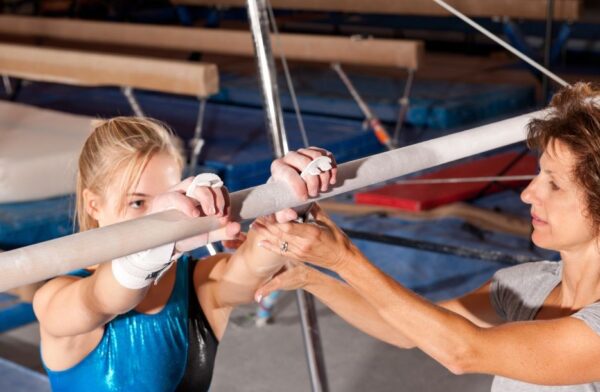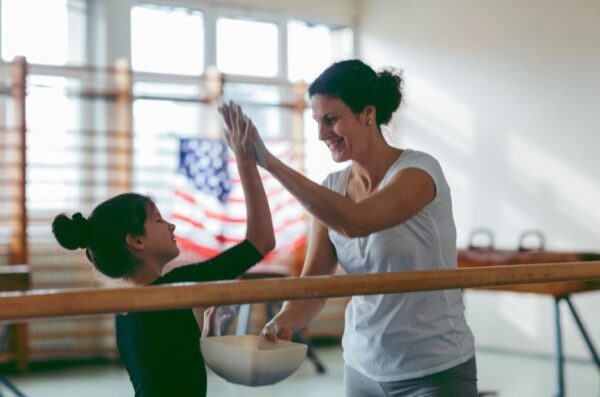
Gymnastics mind-set coach Ariana LeBlanc on what it means to have a mental block and how you can help.
Mental blocks are one of the most frustrating things in the sport of gymnastics. One day, a gymnast can do the skill, and the next day they are standing there frozen, unable to move. So often, we assume the gymnast is not trying and is unmotivated.
Mental Blocks are REAL. Mental blocks do not happen because the gymnast is unmotivated or unwilling. I promise, your gymnast wants to do the skill and would do anything to be able to get their body to go for it.
So why do mental blocks happen? There are so many reasons! Mental blocks are very common in the sport of gymnastics and there are many factors that contribute to mental blocks. Here is a list of some of the most common reasons. It could be one or a combination of things causing the mental block!
- Changes in a gym, coaches
- Afraid of injury or re-injury
- Fear of embarrassment
- Fear of letting others down
- Growth spurt – body changes
- Being a perfectionist
- Reinforcing the block
- Added pressure and stress
- Threats – You won’t move up a level
- Progressing too fast

Mental blocks do not happen because the gymnast is unmotivated or unwilling.
What is happening in a gymnast’s brain during a mental block?
Gymnasts are experiencing a mental block because their brain is sensing a threat. Whether it is a threat of potential injury or embarrassment, the brain senses danger and the brain is putting on the brakes. The brain is doing what it knows best. It is trying to keep the gymnast safe!
So… how can coaches help the gymnast?
As a coach, try to understand where the mental block could be coming from. Have an open, non-judgmental conversation with your gymnast and try to understand if they are afraid of injury, letting others down, or feeling increased pressure. Communicating with your athlete is so important and can help in problem-solving on how to get your gymnast through the mental block.
As coaches and parents, it is normal for us to become frustrated when our athlete has a mental block. Try your best to control your own frustration and emotions and not let your frustrations show. Support your gymnast and encourage them!
What Coaches Want to Avoid:
- Avoid making them stay on the event until they do the skill…Why? Well, when you do this, it creates more stress and pressure for the gymnast, which is just causing the brain to go into fight/flight/freeze mode and put on the brakes, which does not allow your gymnast to go for the skill.
- Making a gymnast stay on an event until they go for the skill can create more opportunities for the gymnast to balk. Why is this a problem? Well, every time your gymnast balks, they are reinforcing that neural pathway in the brain which is reinforcing the block.
- Avoid using conditioning as punishment. Why? Using conditioning as punishment is creating a negative association with conditioning. We do not want to associate conditioning with punishment. Gymnasts need to see conditioning as an essential part of the sport.
- Avoid threatening your gymnast! You aren’t going to move to the next level or you will stay here all day until you go for the skill. This will just add more stress to the athlete and increase the likelihood that the mental block will last.

Avoid threatening your gymnast. Instead, be patient and supportive!
What Coaches Can Do:
- If a gymnast balks more than 2x, have them complete a skill that they can be successful at. For instance, maybe the gymnast is unable to go for their round-off BHS but can do a cartwheel BHS. If a gymnast balks more than 2x on the round-off BHS have them switch to a cartwheel BHS.
- Have your gymnast finish the skill with something they are successful with. Mental blocks and fear bring a gymnast down. It is your job as a coach to help lift them up.
- Be patient and supportive! Do not give up on your gymnasts.
- And remember…your gymnast is not choosing to not do the skill! Fear and mental blocks cause a physical and psychological response in the body. Believe me when I say your gymnast wants to do the skill more than anything else!
If you are an athlete, here are some tips to work through your mental block and help your brain feel safer.
- Use relaxation strategies. Using the breath not only calms the mind but also calms the body and communicates to the brain that it is safe. Try this deep breathing exercise: breathe in for 4, hold for 4, breathe out for 6.
- Use anchor words or mental cues when doing your skill. This helps your brain focus on what you want your body to do. For instance, if your mental block is on a BHS, BHS series, your cues might sound like this: I got this, hands, feet, hands, feet, square.
- Visualize your skill! If you have trouble with visualizing it is ok and normal. It is a skill that takes practice! Try slowing your visualization down or even watch yourself on video if you have one doing the skill successfully.
- Build a confidence ladder. On the confidence ladder, list where you are most comfortable doing your skill all the way to where the skill is the hardest! For instance, it might be series on a line, low beam with mats, low beam no mats, medium beam, high beam with mats and high beam no mats.

Consider relaxation strategies such as deep breathing exercises and visualization.
Parents, I know mental blocks are frustrating for you as well as it is hard to see your gymnast struggle. It is normal to want to try and help “fix” the problem but the best thing you can do is support your child unconditionally. Don’t ask about the mental block unless your gymnast brings it up. If they do, provide a listening ear, and try to avoid giving tips. Also, please do not try to bribe your gymnast. If you do this, it is creating more stress and pressure and fear of disappointment for the gymnast. Again, mental blocks are not an issue with motivation. Stick to what you know best – love and support your gymnast no matter what!
Ariana LeBlanc LMHC, MS, BS is a mind-set coach and former elite gymnast.